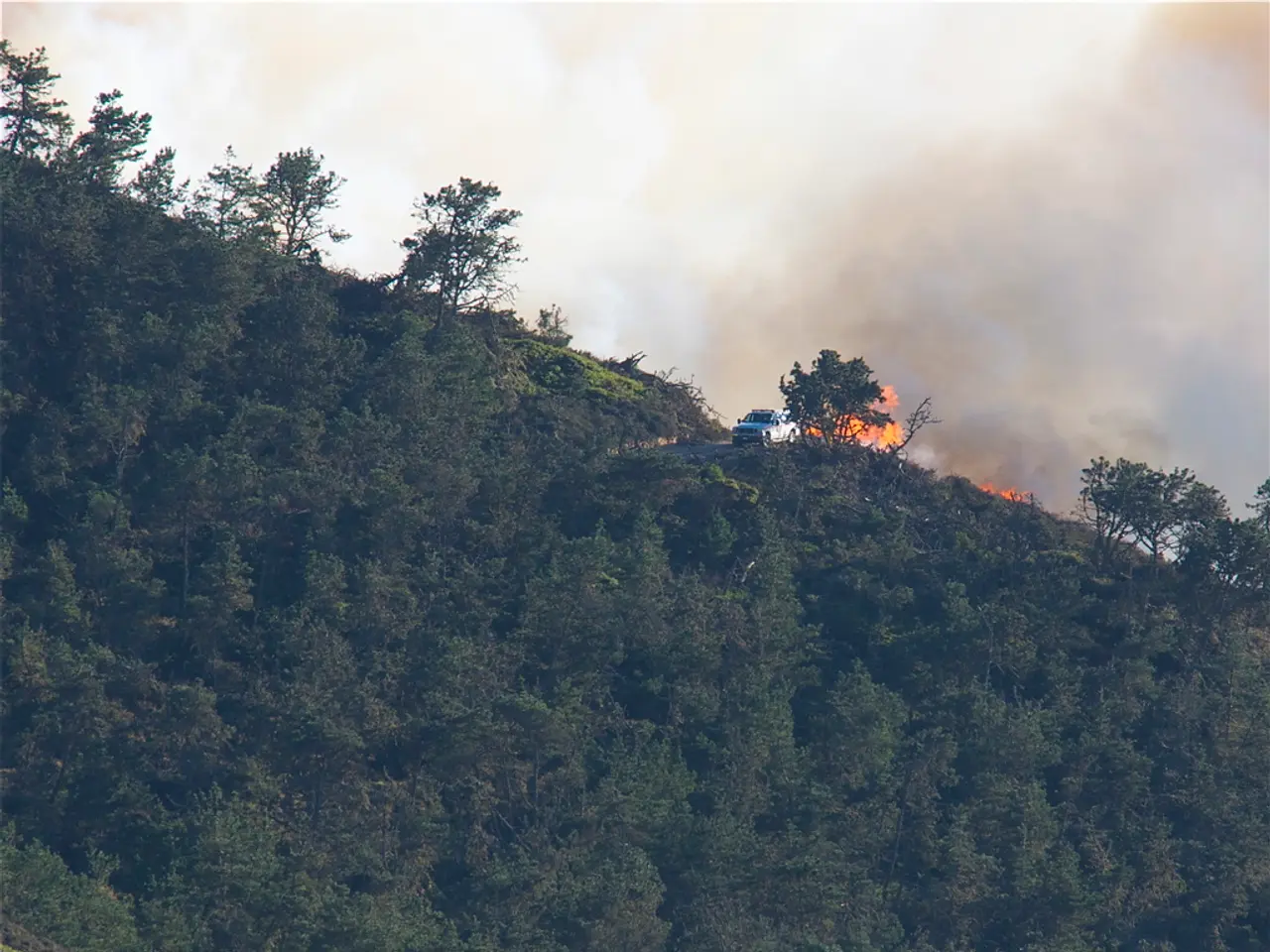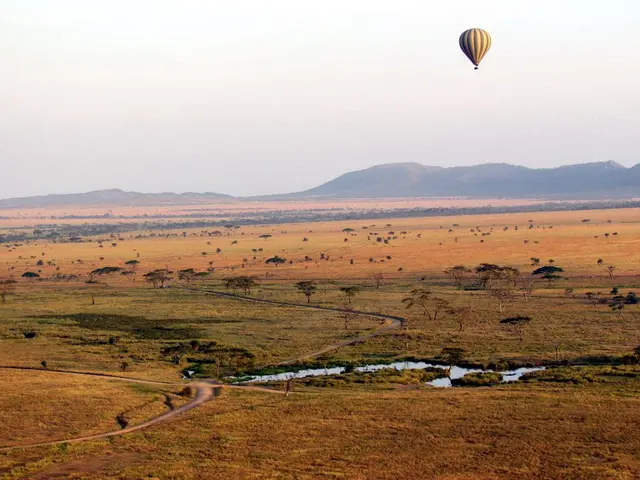devasting blaze ravages vehicles and homes in Turkey's Canakkale, causing widespread destruction
In the picturesque province of Çanakkale, Turkey, wildfires have been raging for several days, causing evacuations, shutting down transportation routes, and posing a threat to both residents and popular tourist destinations.
The fires, which originated from an agricultural field near Sarıcaeli village, have spread rapidly due to strong winds and high temperatures, reaching forested areas[1][2][3]. The current situation involves ongoing wildfires primarily in the city center and southern parts near the Dardanelles Strait. The fires have forced the evacuation of hundreds of residents, including from villages, a university campus, a military area, and a care home. Both the Çanakkale airport and the Dardanelles Strait were temporarily closed due to heavy smoke and fire risks[1][2].
The wildfires have severely impacted Çanakkale’s environment and several residential and resort areas. Among the affected districts are Ayvacık and Kepez, where tourism and local life have faced interruptions due to smoke, fire risk, temporary closures of transport routes, and evacuations[1][2]. Ayvacık was among the districts where wildfires were mostly brought under control with no immediate danger, but the area experienced evacuations and disruptions due to the fire. Kepez, also a significant resort area in Çanakkale province, was notably affected, with evacuations conducted as precautionary measures[1][2].
The Minister of Agriculture and Forestry, Ibrahim Yumakli, announced the current situation regarding forest fires on his social media account[2]. He also revealed that Turkey experienced a severe decline in rainfall in July 2022, with a 71% decrease compared to the same period last year[2]. In July, the rainfall in the Aegean Region, except for Usak, Afyonkarahisar, and Denizli surroundings, decreased. Only 9.6 kilograms per square meter of rainfall was recorded in July 2022[2]. The rainfall in the Western Black Sea, in the east of the Central Anatolia and Mediterranean regions, and in the surroundings of Antalya, Sanliurfa, Mardin, Sirnak, Batman, Van, and Hakkari decreased in July[2].
In a positive development, firefighters have been successful in containing multiple blazes across Canakkale, with the fires in Bolu Mudurnu, Canakkale Ayvacik, and Izmir Dikili having been brought under control as of August 12[4]. However, the fires in Çanakkale continue to pose a significant challenge.
In an effort to prevent further wildfires, fireworks have been banned in Istanbul amid wildfire concerns[5]. Elsewhere in the region, all areas received rainfall below normal levels in July, with the largest drop at 95% occurring in the Marmara Region[2]. In the surrounding area of Karaman, Mersin, and Tunceli, rainfall was recorded at up to twice normal levels in July[2]. The July rainfall in the Marmara Region dropped to the lowest level of the last 65 years[2].
As the fires continue to rage and the region grapples with historically low rainfall levels, the focus remains on the ongoing firefighting efforts and the safety of the residents and tourists in the affected areas.
References: [1] Anadolu Agency. (2022, August 11). Wildfires in Turkey's Canakkale province continue to rage, hundreds evacuated. Retrieved from https://www.aa.com.tr/en/turkey/wildfires-in-turkey-s-canakkale-province-continue-to-rage-hundreds-evacuated/2553881
[2] Reuters. (2022, August 11). Wildfires rage in Turkey's Canakkale province, hundreds evacuated. Retrieved from https://www.reuters.com/world/europe/wildfires-rage-turkeys-canakkale-province-hundreds-evacuated-2022-08-11/
[3] Deutsche Welle. (2022, August 11). Wildfires rage in Turkey's Canakkale province, hundreds evacuated. Retrieved from https://www.dw.com/en/wildfires-rage-in-turkeys-canakkale-province-hundreds-evacuated/a-61826400
[4] Anadolu Agency. (2022, August 12). Fires in Turkey's Canakkale, Bolu, Izmir under control. Retrieved from https://www.aa.com.tr/en/turkey/fires-in-turkeys-canakkale-bolu-izmir-under-control/2553940
[5] Anadolu Agency. (2022, August 10). Istanbul bans fireworks amid wildfire concerns. Retrieved from https://www.aa.com.tr/en/turkey/istanbul-bans-fireworks-amid-wildfire-concerns/2553808
- Despite the ongoing wildfires in Çanakkale, Turkey, the firefighters have successfully contained multiple blazes in Bolu Mudurnu, Canakkale Ayvacik, and Izmir Dikili.
- The Minister of Agriculture and Forestry, Ibrahim Yumakli, announced that Turkey experienced a severe decline in rainfall in July 2022, with a 71% decrease compared to the same period last year.
- In an attempt to prevent further wildfires, fireworks have been banned in Istanbul, a city located far from the current wildfire locations in Çanakkale.
- The weather-forecasting data indicates that all areas received rainfall below normal levels in July, with the largest drop at 95% occurring in the Marmara Region, suggesting potential concerns for the prevailing dry conditions and climate-change impact on Turkey's environment.








